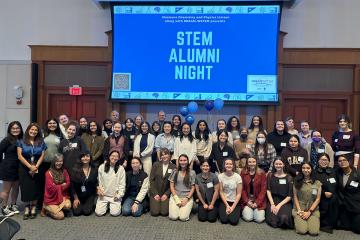Megan McCarty is a social psychologist who teaches courses in social psychology, the psychology of gender, and research methods.
She has two primary areas of expertise. She studies the psychology of gender and diversity as well as small group dynamics. Her psychology of gender and diversity research investigates how violating stereotypes affect individuals’ own thoughts, emotions, and behavior, as well as the reactions of others. Her small group dynamics research focuses on issues of exclusion and emotional experiences in groups. Much of her current research combines these areas to explore how small group processes can perpetuate stereotypes and group differences.
She enjoys collaborating with students on this work. If you are interested in getting involved in my Diversity Issues in Groups Lab, please email McCarty for more information.
Education
- MS and PhD, Social Psychology, from Purdue University
- BA, Psychology, from Bowdoin College
License/Certifications
- Certificate in Psychological Statistics from Purdue University
Courses
- PSYC 203 Research Methods in Psychology (with lab)
- PSYC 220 The Psychology of Gender
- PSYC 248 Social Psychology
- PSYC 308 Research in Social Psychology (with lab)
Research/Special Projects
Broadly, Dr. McCarty's research is motivated by a desire to understand processes that allow us to have positive and productive group interactions without feeling pigeon-holed by our social identities. She conducts research on the psychology of gender and diversity as well as small group dynamics. Much of her research integrates these two areas, investigating the ways in which group processes contribute to the persistence of stereotypes and group differences. In general, her work demonstrates that group processes such as exclusion and group-fit are key forces that discourage participation in gender counter-stereotypic activities, such as women’s interest in both leadership positions and Science, Technology, Engineering, and Mathematics (STEM). She is increasingly interested in issues of diversity broadly, and has ongoing projects regarding sexuality, race, and gender non-binary individuals. She employs a multi-method approach to studying these issues, using a combination of lab, field, and online paradigms.
Publications
McCarty, M. K. (in press). Email responsiveness varies based on the pronouns in the requesters’ email signature: The role of they/them pronouns. Psychology of Sexual Orientation and Gender Diversity.
Iannone, N. E., McCarty, M. K., Parsons, D., & Kelly, J. R. (2024). Take me out of the loop: When do we prefer to self-exclude from groups? Social Psychology. doi: https://doi.org/10.1027/1864-9335/a000549
McCarty, M. K. & Burt, A. (2024). Understanding perceptions of gender non-binary people: Consensual and unique stereotypes and prejudice. Sex Roles, 90, 392-416. doi: http://dx.doi.org/10.1007/s11199-024-01449-2
Burt, A. & McCarty, M. K. (2024). “The only disability in life is a bad attitude”: A quantitative exploration of the impacts of inspiration porn. Modern Psychological Studies, 30, Article 2, 1-40. Available at: https://scholar.utc.edu/mps/vol30/iss1/2
McCarty, M. K., Iannone, N. E., & Kelly, J. R. (2023). The effects of inclusion and overinclusion: Explanations for treatment matter. Social Influence, 18, 1-23. doi: https://doi.org/10.1080/15534510.2023.2270199
Touma Sawaya, A. & McCarty, M. K. (2023). The impact of a brief humanizing intervention on prejudice towards transgender individuals. Graduate Student Journal of Psychology, 20. doi: https://doi.org/10.52214/gsjp.v20i1.10781
McCarty, M. K., Iannone, N. E., & Kelly, J. R. (2022). Information valence moderates out of the loop experiences: Evidence from two novel information exclusion paradigms. Group Dynamics: Theory, Research, and Practice, 26, 365-377. doi: https://doi.org/10.1037/gdn0000151
Jacques, S., Ross, D., & McCarty, M. K. (2022). Perceptions of gender non-binary individuals: Through the lens of gender and race. Psi Chi Journal of Psychological Research, 27, 46-58. https://doi.org/10.24839/2325-7342.JN27.1.46
Scherer, H., Diaz, S., Iannone, N. E., McCarty, M. K., Branch, S. E., & Kelly, J. R. (2022). "Leave Britney alone!": Parasocial relationships and empathy. The Journal of Social Psychology, 162, 128-142. https://doi.org/10.1080/00224545.2021.1997889
McCarty, M. K., Kelly, J. R., & Williams, K. D. (2022). The impact of fleeting exposure to female exemplars of success in STEM. Group Processes & Intergroup Relations, 25, 474-488. doi: http://dx.doi.org/10.1177/1368430220975475
Iannone, N. E., McCarty, M. K., Branch, S. E., & Kelly, J. R. (2018). Connecting in the Twitterverse: Using Twitter to satisfy unmet belonging needs. The Journal of Social Psychology, 158, 491-495. doi: https://doi.org/10.1080/00224545.2017.1385445
McCarty, M. K., Iannone, N. E., Jones, E. E., & Kelly, J. R. (2018). When inclusion hurts: The role of valence in moderating the effects of being in the loop. The Journal of Social Psychology, 158, 93-108. doi: https://doi.org/10.1080/00224545.2017.1314247
Iannone, N. E., McCarty, M. K., & Kelly, J. R. (2017). With a little help from your friend: Transactive memory systems in best friendships. Journal of Social and Personal Relationships, 34, 812-832. doi: https://doi.org/10.1177/0265407516659565
Kelly, J. R., Iannone, N. E., & McCarty, M. K. (2015). Emotional contagion of negative emotions is automatic: An evolutionary explanation. British Journal of Social Psychology, 55, 182-191. doi: https://doi.org/10.1111/bjso.12134
Carlston, D. E., McCall, T. C., McCarty, M. K., & Tay, L. (2015). On being judged by the company you keep: When associates' behaviors lead to misremembering, discounting and transference. Journal of Experimental Social Psychology, 60, 173-182. doi: https://doi.org/10.1016/j.jesp.2015.06.001
McCarty, M. K., & Kelly, J. R. (2015). Perceptions of dating behavior: The role of ambivalent sexism. Sex Roles, 72, 237-251. doi: https://doi.org/10.1007/s11199-015-0460-6
McCarty, M. K., & Kelly, J. R. (2015). When door holding harms: Gender and the consequences of non-normative help. Social Influence, 10, 1-10. doi: https://doi.org/10.1080/15534510.2013.869252
Iannone, N. E., McCarty, M. K., Kelly, J. R., & Williams, K. D. (2014). Friends with each other but strangers to you: Source relationship softens ostracism’s blow. Group Dynamics: Theory, Research, and Practice, 18, 349-356. http://dx.doi.org/10.1037/gdn0000018
McCarty, M. K., Monteith, M. J., & Kaiser, C. R. (2014). Communally constrained decisions in workplace contexts. Journal of Experimental Social Psychology, 55,175-187. doi: https://doi.org/10.1016/j.jesp.2014.07.007
McCarty, M. K., Kelly, J. R., & Williams, K. D. (2014). The cognitive costs of the counter-stereotypic: Gender, social presence, and emotion. The Journal of Social Psychology, 154, 447-462. doi: https://doi.org/10.1080/00224545.2014.933160
McCarty, M. K., Iannone, N. E., & Kelly, J. R. (2014). Stranger danger: The role of perpetrator and context in moderating reactions to sexual harassment. Sexuality & Culture, 18, 739-758. doi: https://doi.org/10.1007/s12119-013-9215-0


